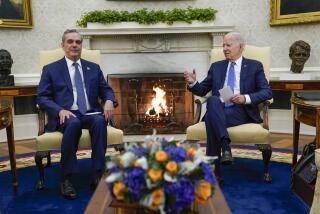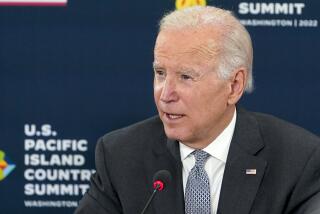Reagan Urges Allies to Aid Filipinos, Afghans
- Share via
WASHINGTON — President Reagan, warming up for his final summit conference with the United States’ leading trading partners, called on the world’s major industrial democracies Monday to launch a joint effort to bolster the economies of the Philippines and Afghanistan.
Unveiling a second proposal that he plans to make at the economic summit conference that begins Sunday in Toronto, Reagan also called for a similar cooperative effort against “the flow of drug profits through the world’s financial institutions.”
Although Administration officials have begun work on both proposals, one White House official said that specific programs will not be ready for presentation to the six other nations, and neither is likely to be in place before Reagan’s term ends Jan. 20.
“Let us join together to help restore the economies of two countries: one, the Philippines, a heroic democracy ravaged by Communist-led insurrection, the other, Afghanistan, a victim of brutal aggression,” Reagan said in a speech to the Atlantic Council, a nonprofit research organization focusing on U.S.-European issues.
Reagan’s remarks reflected the likely course of the meeting, which is expected to focus more than in the past on the problems of the Third World and less on the economies of the participating nations.
Aim for Economic Cooperation
The conference, which will run through Tuesday, is the 14th such annual meeting to promote economic cooperation. In addition to the United States, the participants are Britain, Canada, France, Italy, Japan and West Germany.
Reagan, echoing a theme from previous conferences, called for progress toward free trade and a phasing out of trade barriers and government subsidies that impede international commerce.
“In no field do we all have more weeding to do than agriculture, where subsidies cost the consumers and taxpayers of Europe, North America and Japan $200 billion a year,” he said. He said that the current four-year round of international trade talks is taking up agricultural issues and is nearing the midpoint.
“It’s time to narrow down and lay out specific goals, a road map and a timetable to the finish line,” he said. “In Toronto, we--the heads of the major industrial states--can push our ministers to have that job completed by the end of the year. No excuses.”
The President also called for the summit participants to help the nations of sub-Saharan Africa resolve their debt problems. These nations owe the major Western democracies and Japan a total of $98.7 billion in 1988, according to the International Monetary Fund.
Longstanding Corruption
Administration officials had hoped that the proposal for assistance for the Philippines would be ready in time for the summit. That nation has been suffering severe economic problems, allegedly a legacy of longstanding government corruption left by ousted President Ferdinand E. Marcos.
However, a White House official said that the details have not yet been worked out. The official discounted earlier reports that the Administration was hoping for a $10-billion “mini-Marshall Plan” approach, similar to the assistance effort that helped rebuild Europe’s economies after World War II.
He said that Reagan would propose a multinational, multi-year plan, whose dimensions are still uncertain.
The program of assistance for Afghanistan is even further away, said the official, who spoke on the condition of anonymity.
“Actually, you’re talking about aid to the refugees to facilitate their return to Afghanistan,” he said. The United States has been anticipating the movement of Afghan refugees from Pakistan back into their homeland as the Soviet Union continues its withdrawal of troops after a nine-year occupation.
The official said that assistance would depend on the nature of the government that finally assumes control of the nation.
The proposal to combat drug-money laundering would correspond with growing U.S. efforts to curb international drug trafficking and attack involvement by financial institutions in nations such as Panama.
More to Read
Sign up for Essential California
The most important California stories and recommendations in your inbox every morning.
You may occasionally receive promotional content from the Los Angeles Times.













